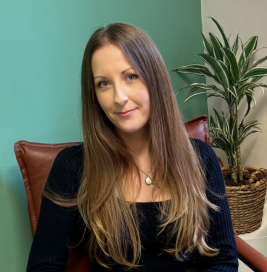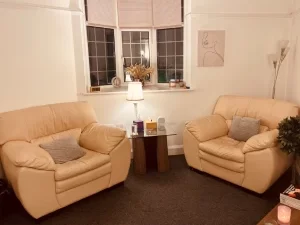Sarah Kirrane Counselling
Counselling in Ruislip and Online
If everyday life feels overwhelming, you're facing a current challenge or past experiences keep resurfacing, you don't have to face them alone.
Hi, I'm Sarah!
I'm a grief counsellor who understands what is is to feel the loss of someone or something important - because I've been there too.
I know what it is like to receive a life changing health diagnosis and to have to make the unwanted decision to begin IVF treatment. And I know what it feels like to lose a special person or animal.
I combine lived experience and specialist training to help you make sense of your feelings, to find healthy ways of coping and to work towards being more compassionate towards yourself.
Some issues I have supported clients through include:
Anxiety, stress, low self-esteem, bereavement, loss, illness, relationship issues, infertility/fertility assisted treatment, difficult past experiences, feeling sad and overwhelmed.
Clients describe our work together as compassionate, grounded and validating - a place to come and be honest without feeling judged.
To find out more and to discuss availability, please contact me here.
Qualifications & Experience
- Level 4 diploma in therapeutic counselling
- Levels 2 and 3 counselling skills
- Certificate in online and telephone counselling
- Helpline Counsellor - Vita Health Group
- Counsellor - Place2be
- Bereavement Visitor - Bereavement Care (Harrow)
- Volunteer Counsellor - Childline
- Ongoing continued professional development
Loss & Bereavement Counselling in Ruislip
"Grief is not a problem to be solved; it's an experience to be carried" - Megan Devine
Grief comes in many forms; the end of a relationship, losing a job, infertility, being on the receiving end of a health diagnosis or the death of a person or beloved pet.
When we are grieving, it is almost impossible to believe that anything can help. We live in a culture that is designed to solve problems and to stop pain, yet we cannot solve grief and we cannot make it go away. There is no 'normal' way to respond to loss and there is no expiry date, despite society telling us there is.
Talking through how you are feeling and how your loss or bereavement is affecting you can provide comfort, support and can help you to find a way to live with your new reality.
Bereavement
“Death steals the future we anticipated and hoped for, but it can't take away the relationship we had.” - Julia Samuel
When someone close dies, the world can seem like a lonely and empty place. It can help to talk with someone who will listen without judging or telling you what to do.
As a human (first!) and a grief counsellor, I understand and continue to learn about the impact that the death of a loved one has on us. Grieving is a personal journey with no predefined 'normal' response or fixed timescale, despite societal expectations.
Sadly, even though death is such a huge part of life, society continues to impose its expectations and judgements on people by telling them how long their grief should last, by making comparisons or by completely avoiding the subject. Society does not mean to be harmful; it just does not like to talk or think about death and dying.
To lose a loved one is probably one of the hardest things we will experience in our lives. There is no 'normal' way to respond to grief and no timescale, despite what society may want.
Grieving is natural and normal and although it is painful, distressing and can make us feel unwell, it is not an illness. It cannot be fixed and we cannot make it go away. Over time, the pain will usually feel less intense and many people will adapt to a life without the person who has died but this will be different for everyone.
It can help to know that even though grief is unique to each individual, many bereaved people have reported some of the following similar feelings: Shock and numbness, pain, anger, guilt, depression, relief, seeing and hearing the person who has died, sadness, lost, exhausted, anxious, frightened, cheated, lacking in purpose, confused, worried, overwhelmed...
Whatever you are feeling at this time, it is important to do what is right for you and know that when it comes to grief, there is no right or wrong way. Your grief is as unique as the relationship you had.
Bereavement counselling gives you the time you need to talk
about the person who has died and how their death is affecting you. It is a place to come and be as messy as your grief is without having to hear about how strong you are or how well you are coping. It can be somewhere for you let go, to be angry, cry, laugh, remember them in your own way and to acknowledge how hard things are without having to protect others from your feelings.
It is important to remember that grief is a natural process and many will have some form of support from friends and family which can sometimes be enough. However, more often than not, the amount of time a friend has to offer will be limited and isn't always enough for the person in need. Family members may be trying to process their own grief and be unable to support one another. Sharing your true feelings with those closest to you can feel risky and can come with unhelpful opinions, feeling judged, unheard or misunderstood and this can have a negative impact on your grief and healing.
"Asking for help isn't giving up", said the horse. "It's refusing to give up" - Charlie Mackesy
If you would like to find out more about my counselling service in Ruislip, & online, please contact me.
Living Loss
Being able to identify and name life experiences as losses worthy of grief can be an important part of healing. Yet often, we tend to identify death as being the only life event worthy of grief.
In today's fast-paced world, our experiences of loss are quickly pushed aside as we are forced to 'get on with it' or 'get over it'.
For some, the source of their grief may be clear, for example, the end of a relationship, the end of a career, retirement, children leaving home, the end of a dream or future plans such as having children, or the loss of good health.
For others, when faced with challenges, intense emotions may be felt but it may be less clear that these feelings actually stem from grief or the loss of their world as they once knew it.
Talking about how you are feeling can help you to gain clarity and understanding and increase self-awareness. Clients often say that, although talking doesn't fix or solve the problems, it makes it easier to face them.
If you feel that you might benefit from having the support of a counsellor, please contact me to find out more about how I work and to talk about your needs at this time.
Chronic Illness
Receiving a life changing diagnosis carries the same emotional burden as grief. And, like you, I have been there. Illness changes our identity - moving from a healthy person to one with one or more conditions to manage.
Having to integrate this unwanted new identity is painful and comes with many emotions especially concerning your body. We can be angry with it, feel powerless and like we are all of a sudden burdening others.
I understand how distressing it is when your body suddenly isn't doing what it's supposed to do and how isolating this can be. I've been there with having to make lifestyle choices, take regular medication and deal with the side effects, not to mention fitting in all of the hospital appointments on top of an already busy schedule.
It can be hard to deal with the responses of friends and family especially when the diagnosis also affects them and particularly when the life you thought you would live now looks different.
If you would like to talk with somebody with their own lived experience of illness, who has been there and understands, please contact me.
Infertility, IVF & Fertility Assisted Treatment
Supporting you through the challenges and uncertainty of infertility and IVF treatment.
If having a baby is something you desire, you may be grieving an anticipated future or the opportunity to parent. The threat of infertility can be extremely distressing and research shows that women tend to assume more responsibility, feeling a sense of failure and finding it harder to feel positive or hopeful when facing treatment.
It is not uncommon to be angry with your body for not doing what it is 'supposed to be doing'. You might feel ashamed and left behind as others go on to have their second and third babies. There can also be an overwhelming sense that you're running out of time and a great sense of loss when thinking about the future. When going through fertility assisted treatment, it can be difficult to plan or look forward to things and relationships that were once pure may now be tainted with feelings of jealousy or resentment.
No matter what stage you are at - just starting out, in the middle of treatment or are taking a break, counselling gives the time for you to slow down, check in with yourself and to explore what self-care really means during this time. I know how emotionally and physically draining the process can be, and how easy it is to put your own true needs last. Together, we can look at practical & meaningful ways to care for your body, mind and heart through all the highs, lows and everything in between.
If you've come to the end of your fertility treatment journey (choice, circumstance or medical advice), it's most likely not the ending you had planned when you started out. You may now be facing a life that looks different from the one you had hoped for. Therapy at this stage of your journey can give time to acknowledge the grief and loss as well as the shift in your identity as well as the quiet strength it takes step away from IVF or assisted fertility treatments. If you are feeling ready to talk, please come and share your experience with me, and perhaps gently begin to imagine what life might look like beyond the fertility journey.
Locations
Ruislip, Hillingdon, North West London
1a Ickenham Road, Ruislip HA4 7BT
Located just off the high street and a few minutes walk from Ruislip train Station. Easily accessible from Uxbridge, Hillingdon, Ickenham, Ruislip, Ruislip Manor, Eastcote, Rayners Lane and South Harrow. Some on street parking available and a pay and display carpark.
Online
Online counselling has grown in popularity in recent years. I currently offer sessions via Teams or Google Meets. Offering many of the benefits that in-person counselling offers, it is also flexible and convenient for those less able to travel or with busy lifestyles.
Sessions & Fees
Finding a therapist you feel comfortable with is very important. I usually suggest that we have an initial call where we can talk about what has brought you here and to consider how we might work together.
I offer both time-limited and open-ended therapy and if we decide to work together, we commit to meet weekly for 50 minutes.
I offer a limited number of fortnightly sessions and will be able to offer you a set time for this but I cannot always accommodate this.
Fee
Counselling with me costs £80 per 50-minute session.
75 and 90-minute sessions (online only) can also be discussed if you feel you might need more time.
Before booking a session, we will arrange a 20-minute introductory telephone call which I do not charge for.
As a registered member of the BACP (British Association for Counselling and Psychotherapy), I am bound by, and adhere to, its ethical framework for good practice in counselling and psychotherapy and I am subject to the BACP professional conduct code.
For your protection and reassurance, I am fully insured, hold an enhanced DBS (criminal check) and am registered with the Information Commissioner's Office (ICO).
Confidentiality is central to the therapeutic relationship and I will work to ensure that it is fully preserved both during and after our work together. However, there are some limitations which I will explain clearly during our first session.
Contact Me
Making contact with a therapist can be a difficult first step. It is normal to feel unsure, nervous or anxious about opening up to a counsellor. When you think you might be ready, I will be very happy to discuss your needs, worries and preferences.
You can submit an enquiry using my contact form, or email me at info@skirranecounselling.com, where we will agree a convenient day and time for me to call you to talk about what you are hoping for and take it from there.
I offer counselling sessions in Ruislip and online. All enquires are usually answered within 24 hours, and all contact is strictly confidential.
“We think we listen, but very rarely do we listen with real understanding, true empathy. Yet listening of this very special kind, is one of the most potent forces for change that I know.” - Carl Rogers




